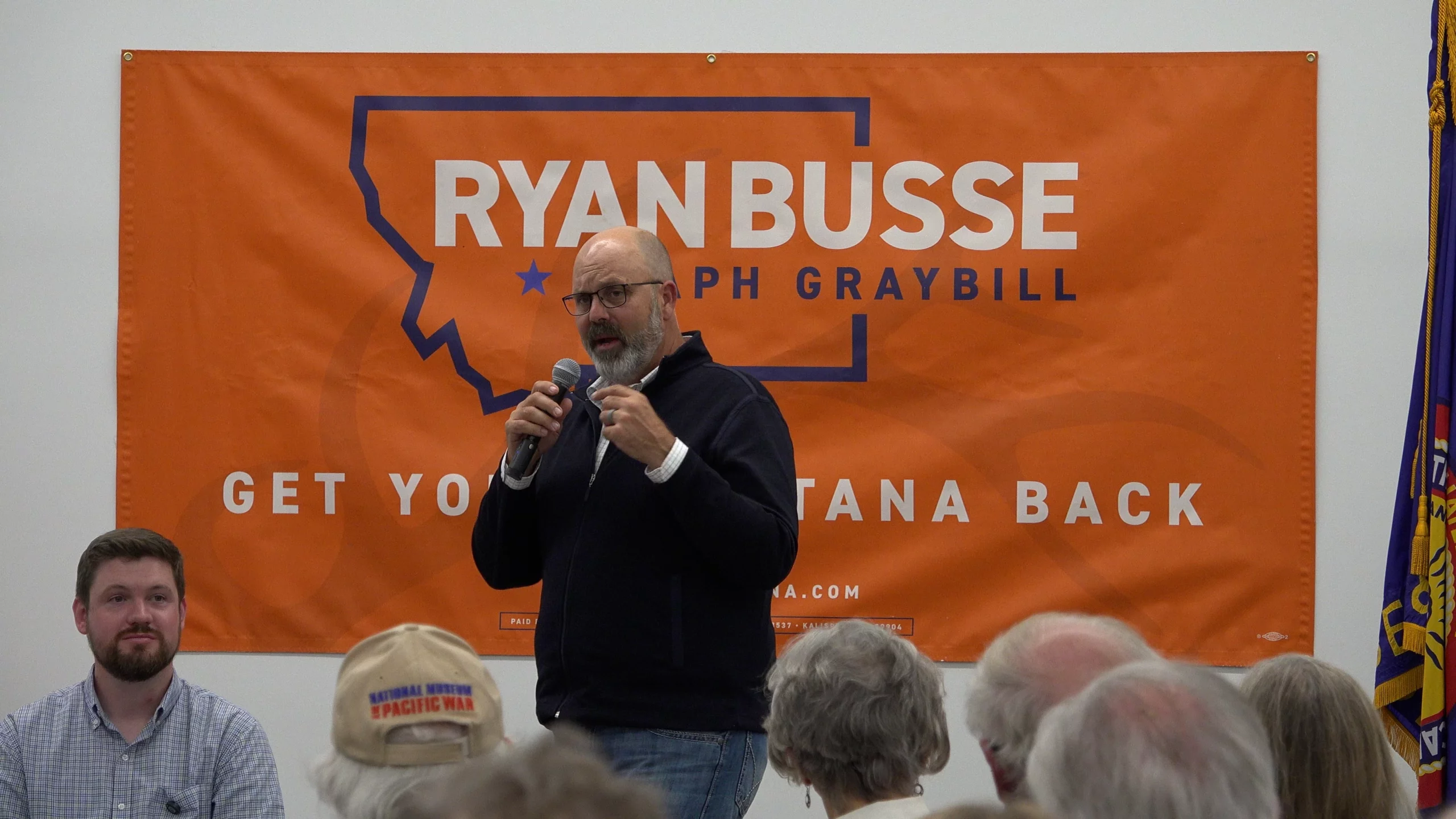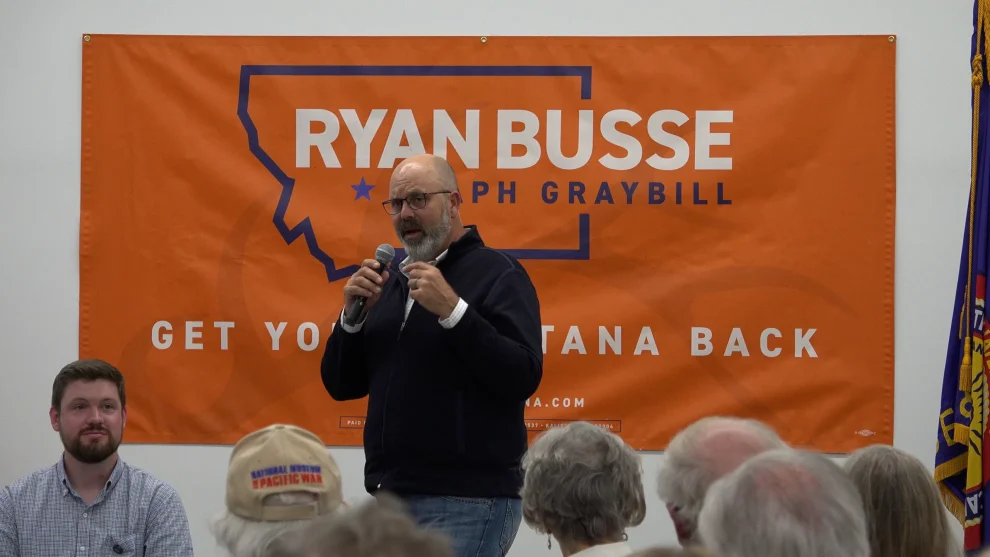BILLINGS, Montana — Republicans in Montana are on the cusp of achieving a feat only seen once before in the state’s history: a sweep of its Senate seats, governor’s mansion, and legislature at the same time.
It’s a scenario Ryan Busse, the Democratic nominee challenging Gov. Greg Gianforte (R-MT), doesn’t want to give much thought to.
“I don’t spend any time thinking about that right now,” Busse told the Washington Examiner. “I think people who care about this state, if that comes to pass, are going to have to buckle down and figure out what’s next. It’ll be a tough battle if that happens.”
Not since more than a century ago — in 1896, just seven years after Montana became the 41st state — has the GOP concurrently held both Montana Senate seats, the governorship, and both legislative chambers.
A loss by Sen. Jon Tester (D-MT) to Republican rival Tim Sheehy, an outcome that would likely foreshadow other races for down-ballot Democrats like Busse, would almost certainly allow a sea of red to once again crash across the Great Plains State. The race is also on track to be the majority-maker for which party takes the U.S. Senate, a chamber currently held by Democrats by a one-seat margin.
The prospects of Montana Democrats avoiding a repeat of history, albeit for only the second time since the state joined the Union, looks increasingly dim.
Polling and nonpartisan election forecasters give an edge to Sheehy, a former Navy SEAL and Montana businessman, over Tester, a third-generation dirt farmer who’s served in the Senate since 2006 and is seeking a fourth consecutive term. Montana’s other senator is Republican Steve Daines, who is not up for reelection.
The race between Busse, an ex-firearms executive, and Gianforte, a former tech executive and congressman, is rated far less competitive and is considered a “solid” Republican seat.

Voters head to the polls for the contests in just a few weeks’ time against the backdrop of a legislature already held by Republicans with a super majority, although the party expects to lose some seats this year.
“That’s not healthy to have one party have extreme control over a state, be it Democratic or Republican, and that’s the case in Montana,” said Lou Hanebury of Billings, a retired U.S. Fish and Wildlife Service employee who backs Busse and Tester. “I scratch my head. I don’t know what’s going on.”
Busse’s lieutenant governor running mate, Raph Graybill, pitched voters during a Tuesday night town hall on why they should embrace “divided government” by electing more Democrats like them.
“In my experience, when you have divided government, the legislators realize that their dumb ideas, the ideas that are just about phoning the other side or making a statement, it is going to waste people’s time,” said Graybill, who served as chief legal counsel to former Gov. Steve Bullock (D-MT). “They sink to the bottom because people know they’ll get weaker, and these good ideas percolate to the top.”
Sheehy certainly doesn’t see it that way, at least not at the national level. He makes the case that Tester is trying to deflect from the national importance of his election by projecting a more centrist image that leans into his Montana roots. He and other Republicans say that Tester would hand Democrats power in Washington even if he breaks with his party on occasion.
“He can’t be affiliated with the Democrats’ national platform,” Sheehy told rallygoers on Monday in Glendive, a small east Montana town near the North Dakota border that’s home to barely 4,000 residents. “He tries to make the election local and say, ‘Well, I’m a dirt farmer. I got a flat-top hairdo, and I got my fingers cut off in a meat grinder,’ and all those other things. ‘I’m a local guy, forget about what’s going on national.’”
Montana is no doubt a Republican stronghold for president; former President Donald Trump won by more than 16 points in 2020 and 20 points in 2016. But its ruby-red status at the state level is a newer feature that has eclipsed the once purple reputation that existed for down-ballot races throughout the more than 125 years since a Republican takeover of its state offices.
“There are cycles to all this stuff. But I think ultimately, Montana will always give a candidate a fair shake, and they’re not crazy about one party being in charge of anything,” said Eric Stern, an ex-senior adviser to Bullock and former Gov. Brian Schweitzer (D-MT). “There’s always going to be a place for Democrats in Montana, and there will be good years and bad years and good eras and bad eras.”
Montana Democratic state Rep. Paul Tuss placed the onus on state and local Democrats to better “focus on the core issues that are central to their families,” including affordable housing, infrastructure, and simply embracing a style of “government that works.”
CLICK HERE TO READ MORE FROM THE WASHINGTON EXAMINER
Tuss is a longtime friend of Tester, whose R+8 district overlaps with the state Senate district Tester once held before being elected to Congress.
“I think that sometimes we get wrapped up with regard to the cultural wars that seem to dominate national politics, and we sometimes lose the argument when those things occur,” Tuss said. “Rather than discussing these meat and potato issues that really are the issues that are so central to our party, sometimes we get lost in those culture war issues.”
























